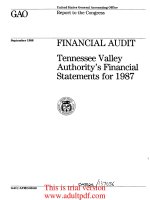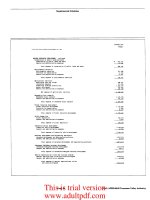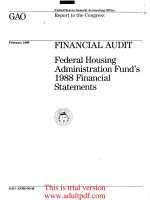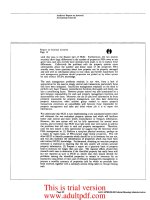United States General Accounting Office GAO February 1990 Report to the Congress_part1 pdf
Bạn đang xem bản rút gọn của tài liệu. Xem và tải ngay bản đầy đủ của tài liệu tại đây (755.45 KB, 11 trang )
T
GAO
United States General Accounting Office
Report to the Congress
3
*
February 1990
FINANCIAL AUDIT
Federal Housing
Administration Fund’s
1988 Financial
Statements
GAO/AFMD-90-36
This is trial version
www.adultpdf.com
GAO
United States
General Accounting Office
Washington, D.C. 20548
Comptroller General
of the United States
B-206207
February 9,199O
To the President of the Senate and the
Speaker of the House of Representatives
This report presents the results of our audit of the Federal Housing
Administration Fund’s consolidated financial statements as of Septem-
ber 30, 1988. Reports on the Fund’s internal accounting controls and on
its compliance with laws and regulations are also provided.
As a result of the 1988 financial audit, the Federal Housing Administra-
tion
(FHA)
adjusted its financial statements from a loss of $858 million to
a loss of $4.2 billion, which reduced its government equity to a cumula-
tive deficit of $2.9 billion. The 1988 losses resulted from rising defaults
in economically stressed regions, sales of foreclosed properties at less
than carrying values, the failure of several large coinsurers, and pro-
gram fraud and abuse. The full extent of losses attributable to program
fraud and abuse through September 30,1988, is not yet known.
We and Price Waterhouse have declined to express an opinion on
WA’S
1988 financial statements because of an inability to ascertain the extent
of losses due to fraud and abuse and because of the lack of an accurate
inventory of foreclosed property. We are also concerned about large
potential future losses in FHA’S General Insurance
(GI)
Fund. The audit
also revealed serious internal accounting control weaknesses in third-
party monitoring, financial management systems, insurance program
design, controls over cost and claims settlement, and the performance of
basic accounting functions. In addition, the audit showed that
FHA
did
not fully comply with the Debt Collection Act of 1982.
Background
The Federal Housing Administration
(FHA)
was established in 1934
under authority granted to the President by the National Housing Act
(Public Law 73-479) and became in 1948 a wholly owned government
corporation for purposes of the Government Corporation Control Act
(GCCA).
FHA
and its functions were transferred to the U.S. Department of
Housing and Urban Development
(HUD)
in 1965. The GCCA now provides
that the Secretary of
HUD,
when carrying out the duties and powers
related to the
F’HA
Fund, is subject to the provisions of the GCCA.~ The
basic purpose of
FHA
programs is to encourage improvements in housing
standards and conditions, provide an adequate home financing system
’ Herein, the FHA Fund. and the Secretary’s administration of it, will be referred to simply as FHA.
Page 1 GAO/AFMD-90-M Federal Housing Administration
This is trial version
www.adultpdf.com
E-206207
through mortgage insurance, and exert a stabilizing influence on the
mortgage market. To carry out this purpose, the Secretary of
HUD
administers FHA through four separate funds for its various mortgage
insurance programs. As of September 30, 1988,
FHA
had $303 billion of
insurance-in-force.
Under the provisions of 31 USC. 9105, we are required to audit FHA at
least once every 3 years. We were unable to perform an audit of
FHA'S
fiscal year 1981 financial statements due to significant accounting and
reporting changes needed (GAO/AFMD-~~-~~, June 10, 1983). In 1985, we
terminated our audit work on FHA’S fiscal year 1984 financial statements
due to numerous deficiencies in FHA’S accounting systems and financial
records and changes in agency systems and staff. Since 1984,
FHA
has
made a number of improvements in agency systems, staffing, and man-
agement, which we considered sufficient, to permit an audit of its state-
ment of financial position as of September 30, 1987.
The 1987 and 1988
Audits
To fulfill our audit responsibility, we contracted with the independent
certified public accounting firm of Price Waterhouse to conduct financial
audits of FHA for 1987 and 1988. Due to the magnitude of accounting
and reporting changes needed, as noted in prior year audits, it was not
practical to audit FXA’S consolidated statements of operations and cash
flows for the year ended September 30,1987. For these reasons, it was
deemed necessary to restrict the scope of Price Waterhouse’s work to
the audit of FHA’S September 30, 1987, statement of financial position to
establish opening balances, and we did not require reports on internal
accounting controls and compliance with laws and regulations
(GAO/
AFMD893,
May 12, 1989). However, these reports are presented as part
of the consolidated financial statement audit for fiscal year 1988.
We determined the scope of the audit work, monitored its progress at all
key points, reviewed the working papers of the certified public
accountant, and performed other procedures as we deemed necessary.
The audits were conducted in accordance with generally accepted gov-
ernment auditing standards, except for the previously discussed scope
restriction on the 1987 audit.
Disclaimer of Opinion
Price Waterhouse has disclaimed expressing an opinion on
FHA'S
1988
and 1987 financial statements because it was unable to ascertain the
amount of potential losses involved in alleged improper diversions of
property sales proceeds by certain private closing agents contracted by
Page 2 GAO/AFMD#X% Federal Housing Administration
This is trial version
www.adultpdf.com
B-206207
HUD
to sell HUD-owned properties and other alleged improprieties and
because
FHA
did not maintain an accurate inventory of foreclosed
properties. We concur with Price Waterhouse’s disclaimer.
As of September 30, 1988, FHA had $3.1 billion of foreclosed property
held for sale ($2.5 billion in 1987) less an estimated allowance for losses
of $1.4 billion ($1.1 billion in 1987). The alleged diversions resulted, in
part, from internal accounting control weaknesses involving HuD’s
inability to properly monitor both the collection and the prompt deposit
of property sales proceeds. As of September 15, 1989, the amount of the
losses that will ultimately be incurred because of the alleged diversions
had not been determined. Further, the amount of losses applicable to
FHA’S 1988 and 1987 financial statements is not ascertainable and could
have a significant impact on FHA’s financial position, results of opera-
tions, and cash flows. HUD investigations into this matter are currently
pending.
Price Waterhouse’s audit of FHA’S financial statements also disclosed a
material uncertainty with respect to FHA’S General Insurance (GI) Fund,
which has incurred substantial losses due to the default of several coin-
suring lenders. Because of insufficient levels of capital required of coin-
suring lenders and the lack of FHA program monitoring, additional losses
may result. A provision of $960 million has been recorded in the 1988
consolidated statement of operations for the amount of estimated losses
resulting from existing and probable defaults in the multifamily coinsur-
ance programs. An additional provision of $275 million has also been
recorded for probable defaults of FHA-insured hospital mortgages, based
upon unfavorable financial conditions involving several hospital mort-
gages. HUD’S actuary has determined that, in the aggregate, the GI Fund
premiums are insufficient to cover its losses, and the Fund must depend
on borrowings from the U.S. Treasury and appropriations to sustain its
operations. However, given the probability that additional losses will
take place, FHA cannot presently estimate the amount of premium defi-
ciency or the level of support it will ultimately require from the 1J.S.
Treasury.
Additionally, Price Waterhouse’s report emphasized that FHA’S Mutual
Mortgage Insurance
(MMI)
Fund is operated as a mutual fund and is
required to be “actuarially sound,” so that over the life of the fund, pre-
miums are sufficient to pay claims and expenses. The MMI Fund, FDA’S
largest, with $229 billion of a total $303 billion of insurance-in-force,
incurred 1988 losses of $1.4 billion, reducing its equity to $1.8 billion as
Page 3
GAO/AFMD-90-36 Federal Housing Administration
This is trial version
www.adultpdf.com
B-206207
of September 30, 1988. Despite this current loss,
HUD'S
actuary has esti-
mated
that
future revenue will exceed future claims and expenses for
the
MMI
Fund. However, actuarial studies are currently underway to
determine whether there are structural or design weaknesses in the
MMI
fund that could cause material losses.
The 1988 unaudited financial statement amounts released by
FHA
and
reported to the U.S. Treasury in December 1988 disclosed a loss of
$858 million for all four
FHA
funds. During the audit, Price Waterhouse
proposed, and
FHA
recorded, over 100 adjustments to correct
FHA'S
accounts which, in the aggregate, reduced government equity by $3.4
billion and resulted in a cumulative deficit of $2.9 billion. The $3.4 bil-
lion of audit adjustments were primarily the result of net increases in
accruals for claims not yet reported. FXA must report to the U.S. Trea-
sury financial results for the fiscal year ended September 30 by Decem-
ber 31 of each year, requiring estimates of incurred but not reported and
probable future claims Audit work by Price Waterhouse disclosed the
need to report additional claims based upon actual experience and the
recognition of losses at
the
time of default rather than at the time of
foreclosure-an average lag of 15 months.
Serious Internal
Accounting Control
Weaknesses Exist
The report by Price Waterhouse on internal accounting controls dis-
closed six conditions believed to be material weaknesses and made a
number of suggestions to address those weaknesses. Those weaknesses
are as follows:
l
Monitoring of underwriting, property management, and collection of
property sales proceeds delegated to private sector third parties is
ineffective.
. Financial management systems do not provide timely and accurate
information on programs, nor do they hold managers accountable for
program results and effectiveness.
l
Structural or design flaws exist in the multifamily coinsurance program,
due to insufficient levels of capital required of coinsuring lenders, and in
the hospital mortgage insurance program, due to uncoordinated under-
writing practices.
l
The
system
for foreclosed property inventory cannot account for
acquired properties and their value, and the cash management system
does not ensure that proceeds collected by third parties on sales of fore-
closed property are promptly deposited in
FHA'S
Treasury accounts.
Page 4 GAO/AFMD9@36 Federal Housing Administration
This is trial version
www.adultpdf.com
5206207
l
Controls over cost are inadequate, multifamily insurance claims benefits
are not being paid promptly, and controls are inadequate to detect mis-
representations by mortgagees and lenders.
l
Routine and basic accounting functions, such as reconciling accounts to
supporting records, providing support to justify payments, controlling
funds held on behalf of others, and properly recording transactions, are
not being performed.
Problems Are
Longstanding
Most of these fundamental accounting and financial reporting problems
are the same ones that
GAO
and the
HUD
Inspector General have been
reporting since the early 1980s.
HUD
has not been diligent in correcting
problems cited by auditors or in its own Federal Managers’ Financial
Integrity Act (FMFIA) reports. While
HUD
staff members responsible for
FHA activities have generally responded to
GAO
and Inspector General
recommendations and to the weaknesses disclosed in the FMFIA reports,
resolution of the findings has often been delayed and some findings
have not been addressed at all. In addition, in some cases, there were no
follow-up reviews to determine if proposed procedures had, in fact,
resolved the cited problems.
For example,
HUD'S
1987 and 1988 FMFIA reports disclosed that inade-
quate controls existed which provided the potential for private closing
agents to manipulate or otherwise take funds for their own use or to
delay the transfer of such funds to
HUD.
This same weakness was noted
during the 1988 audit. Subsequently, a private closing agent, known as
“Robin
HUD,"
admitted to embezzling $5.5 million of
HUD
funds during
this period.
These weaknesses, findings with which we concur based upon our
review of the auditors’ working papers, are discussed in detail in the
accompanying report on internal accounting controls.
Noncompliance With
The report by Price Waterhouse on compliance with laws and regula-
the Debt Collection
Act
tions disclosed an instance of noncompliance, which could impact
FHA'S
ability to effectively collect money it is owed. FHA did not fully imple-
ment the Debt Collection Act of 1982 because it failed to take collection
action after foreclosed property was acquired. The noncompliance with
the Debt Collection Act of 1982, a finding with which we concur based
upon (1) our review of the auditors’ working papers and (2) the actions
that should be taken to fully implement the act, are discussed in detail in
the accompanying report on compliance with laws and regulations. In
Page 5
GAO/AFMD-SW6 Federal Housing Administration
This is trial version
www.adultpdf.com
5206207
addition, the report notes that there are a number of investigations cur-
rently underway regarding alleged improprieties in
HUD'S
administration
of
FHA.
These investigations may reveal other violations of laws and
regulations.
During the course of its examination, Price Waterhouse also identified
several matters which, although not material to the consolidated finan-
cial statements, are being communicated for
FHA'S
consideration in a sep-
arate management letter.
Current FHA
Initiatives
.
.
.
.
.
.
.
.
FHA’S accounting and financial management problems are long-standing
and well-documented. Correction of these problems will require multi-
year solutions and a long-term commitment by top management. The
new management at
HUD
has started to address various deficiencies to
strengthen
FHA,
which include:
announcing that the Secretary will appoint a Chief Financial Officer at
HUD
and a Controller at FHA;
establishing a task force to gather data, assess problems, and develop an
action plan with milestones addressing the improvements needed in
accounting and financial management systems;
increasing monitoring and enforcement activities of private sector third
parties;
redirecting FHA’S accounting and computer systems to generate timely
and accurate data for financial and program management;
performing an independent actuarial analysis of the
MMI
and
GI
Funds;
reviewing controls over programs, particularly where abuses have
occurred, to correct weaknesses or terminate ineffective programs;
publishing annual audited financial statements; and
implementing recommendations resulting from audits.
Conclusions
There are a number of serious financial management problems at
FHA
which contribute to its losses. These problems are exemplified in the
lack of monitoring of responsibilities delegated to private sector third
parties; the poor quality of financial information available to manage-
ment; the weak financial management systems and internal control pro-
cedures; design flaws in the multifamily coinsurance and hospital
mortgage insurance programs; the substandard performance of essential
accounting functions; and management’s inattention to weaknesses iden-
tified by
GAO,
the Inspector General, and
FHA'S
own FMFIA reports.
Page 6 GAO/AFMD-96-36 Federal Housing Administration
This is trial version
www.adultpdf.com
B-206207
As a result of these financial management problems, FHA is susceptible
to mismanagement and the unnecessary risk that fraud and abuse will
occur and not be detected. Such conditions also impede management
from assessing the level of risk arising from normal insurance opera-
tions. Accurate and timely financial information for each program and
location is essential to effectively manage MA’s insurance programs.
It is because FHA has begun to prepare financial statements and, most
importantly, that these statements have been independently audited,
that the magnitude of
FHA'S
problems is becoming evident. Annual
audits of financial statements would provide the Congress and the pub-
lic an objective assessment of management’s performance. Additionally,
financial reporting can provide a measurement tool for effective con-
gressional oversight.
We believe that the initiatives discussed above, if properly implemented,
should address the problems cited in this report.
Recommendation to
the Congress
We recommend that the Congress, through its appropriation, authoriza-
tion, and oversight committees, hold annual hearings on the actions of
FHA to ensure that FHA resolves the financial management problems
identified, including evaluating its systems, correcting the material
weaknesses identified, and ensuring that similar problems do not occur
in the future. To assist in its oversight role, we believe the Congress
should require the Secretary to provide audited financial statements,
reports on internal accounting controls and compliance, and manage-
ment’s report required by the Federal Managers’ Financial Integrity Act.
We are sending copies of this report to the Director of the Office of Man-
agement and Budget; the Secretary of the Treasury; the Secretary of the
Department of Housing and Urban Development;
HUD'S
Assistant Secre-
tary for Housing, who serves as the Federal Housing Commissioner; and
HUD'S
Assistant Secretary for Administration.
Charles A. Bowsher
Comptroller General
of the United States
Page 7
GAO/AFMD90-36 Federal Housing Administration
This is trial version
www.adultpdf.com
Contents
Letter
1
Independent Auditors’
Report
10
Auditors’ Report on
Internal Accounting
Controls
13
Auditors’ Report on
Compliance With
Laws and Regulations
Financial Statements
26
29
29
30
31
32
Consolidated Statement of Financial Position
Consolidated Statement of Operations and Government
Equity (Deficiency)
Consolidated
Statement
of
Cash Flows
Notes to Consolidated Financial Statements
Supplemental
Information
Consolidating Statement of Financial Position
Consolidating
Statement
of Operations and Government
Equity (Deficiency)
Consolidating Statement of Cash Flows
48
48
49
50
Abbreviations
CMHI
Cooperative Management Housing Insurance
FHA Federal Housing Administration
GI
General Insurance
GCCA
Government Corporation Control Act
HUD
Housing and Urban Development
MM1
Mutual Mortgage Insurance
SRI
Special Risk Insurance
Page 8
GAO/AFMD!#O-36 Federal Housing Administration
This is trial version
www.adultpdf.com
Page 9
GAO/AFMD-9@36 Federal Housing Administration
This is trial version
www.adultpdf.com
Independent Auditors’ Report
Price Viterhouse
To the Comptroller General
of the United States
and the Secretary
of Housing and Urban Development
We were engaged to audit the accompanying consolidated statements of
financial position of the Federal Housing Administration (FHA), a fund of the
Department of Housing and Urban Development (HUD), as of September 30,
1988 and 1987, and the related consolidated statements of operations and
government equity (deficiency), and of cash flows for the fiscal year ended
September 30, 1988. These financial statements are the responsibility of FHA’s
management.
Allegations have been
made
about improper diversions of property sales
proceeds by certain private closing agents contracted by HUD to sell HUD-
owned property. This property is reported in the FHA financial statements.
The alleged diversions resulted, in part, from internal control weaknesses
involving HUD’s inability to properly monitor the collection and prompt
deposit of property sales proceeds, or to maintain an accurate inventory of
foreclosed properties. The Inspector General has estimated that such improper
diversions may lead to substantial losses, but to date, the amount of the losses
that will ultimately be incurred by HUD has not been determined, nor is HUD
able to ascertain how much, if any, of these losses are already reflected in the
1988 financial statements. Further, ongoing investigations into this matter have
not yet been completed. There are a number of other investigations currently
being conducted about other alleged improprieties involving HUD’s
administration of FHA. These investigations could reveal violations of laws
and regulations, but to date, a final determination about such violations has
not been made. We have been unable to apply other auditing procedures to
satisfy ourselves regarding the alleged improper diversions of property sales
proceeds or the extent to which the inventory of foreclose-d property reflected
in the accompanying financial statements may be misstated, nor were we able
to determine the possible impact on the financial statements of other
investigations currently being conducted. These matters could have a
significant impact on FHA’s financial position, results of operations and cash
flows.
As discussed in Note 8, FHA’s General Insurance (GI) Fund has incurred
substantial losses primarily relating to its multifamily coinsurance programs, and
to a lesser degree, to its insurance of hospital mortgages. In September 1988,
the Government National Mortgage Association (GNMA), a government
corporation operated by HUD which guarantees securities backed by FHA-
Page 10
GAO/AFMMW6 Federal Housing Administration
This is trial version
www.adultpdf.com









